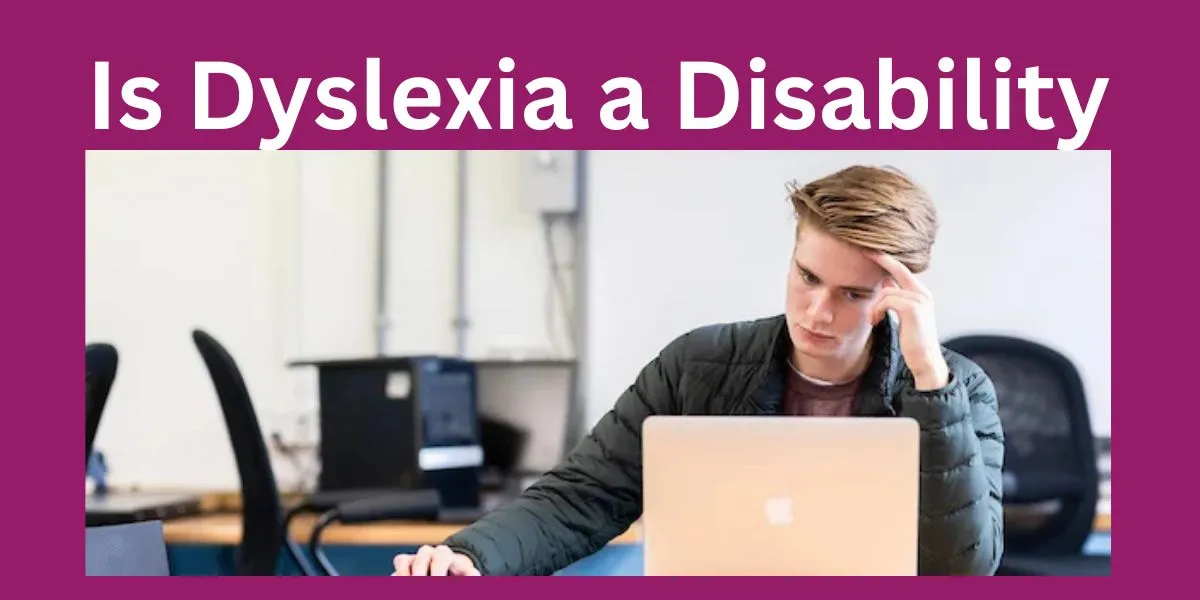Have you ever wondered if dyslexia is officially considered a disability? Dyslexia is often misunderstood, and many people are unsure whether it qualifies as a disability or just a unique way of thinking. Let’s unpack the facts, myths, and realities about dyslexia, explore how it impacts individuals, and answer the big question: Is it truly a disability?
What Is Dyslexia?
A Quick Definition
Dyslexia is a learning difference that primarily affects reading, writing, and spelling abilities. It’s a neurological condition, meaning it stems from the way the brain processes language.
It’s Not About Intelligence
Let’s get one thing straight—dyslexia has nothing to do with intelligence. Many dyslexic individuals are highly intelligent and creative. Some of the most brilliant minds in history, like Albert Einstein and Leonardo da Vinci, were believed to have traits of dyslexia.
The Legal Definition of a Disability
What Makes Something a Disability?
According to the Americans with Disabilities Act (ADA), a disability is any condition that substantially limits one or more major life activities. So, does dyslexia fit the bill?
Dyslexia in the Eyes of the Law
Yes, dyslexia is legally considered a disability under laws like the ADA and the Individuals with Disabilities Education Act (IDEA). These laws ensure that individuals with dyslexia are entitled to accommodations in schools, workplaces, and other areas of life.
How Dyslexia Affects Everyday Life
The Academic Impact
For students, dyslexia can make reading assignments, tests, and even following classroom instructions challenging. But with the right support, they can thrive just like their peers.
Challenges in the Workplace
In a work setting, dyslexic individuals might struggle with tasks involving heavy reading or writing. However, they often excel in creative and problem-solving roles, bringing a fresh perspective to their teams.
Emotional Toll
Struggling with dyslexia can also take an emotional toll, especially if the person doesn’t receive the support they need. Frustration, low self-esteem, and anxiety are common side effects.
Is Dyslexia Really a Disability or Just a Different Ability?
The “Different Ability” Argument
Some argue that dyslexia isn’t a disability but a difference in how the brain processes information. After all, many dyslexic individuals excel in areas like art, innovation, and entrepreneurship.
Why It’s Still Considered a Disability
While dyslexia does come with unique strengths, the challenges it poses in traditional academic and workplace settings make it a disability under the law. The label isn’t meant to diminish someone’s abilities but to ensure they get the support they need.
Accommodations and Support for Dyslexia
In Education
Schools often provide accommodations like extended test times, audiobooks, and specialized instruction to help dyslexic students succeed.
In the Workplace
Employers can support dyslexic employees by offering tools like text-to-speech software, voice typing, and flexible deadlines.
Everyday Life
From apps that convert text to audio to simplified navigation tools, technology has made it easier than ever for dyslexic individuals to overcome everyday hurdles.
Strengths of Dyslexia
Creativity and Innovation
Did you know that many successful entrepreneurs and artists are dyslexic? Their ability to think outside the box is often a huge asset.
Problem-Solving Skills
Dyslexic brains are wired differently, which can make them excellent at seeing patterns, solving problems, and coming up with innovative ideas.
Resilience
Overcoming challenges builds resilience. Dyslexic individuals often develop strong perseverance and adaptability, which serve them well in all areas of life.
Misconceptions About Dyslexia
Myth #1: Dyslexia Is Rare
Dyslexia is far more common than most people realize, affecting about 10-15% of the population.
Myth #2: Dyslexia Means You Can’t Read
Dyslexia doesn’t mean someone can’t read; it just means they process language differently. With the right strategies, many dyslexic individuals become proficient readers.
Myth #3: Dyslexia Goes Away
Dyslexia isn’t something you grow out of, but with support and coping strategies, its impact can be minimized over time.
How Society Can Be More Inclusive
Raising Awareness
Educating people about dyslexia is the first step in breaking down stigmas and misconceptions.
Promoting Early Diagnosis
The earlier dyslexia is identified, the sooner individuals can receive the support they need to succeed.
Celebrating Neurodiversity
Let’s move beyond the limitations of traditional definitions and celebrate the unique strengths that dyslexia brings to the table.
The Verdict: Is Dyslexia a Disability?
Yes, dyslexia is a disability in the legal and practical sense. It can create significant challenges in traditional settings, which is why accommodations and support systems are so crucial. However, it’s also a difference that brings unique strengths and perspectives. In many ways, it’s both a challenge and a superpower.
Conclusion
Dyslexia is undeniably a disability, but it’s also so much more. It’s a testament to the diversity of the human brain and a reminder that “different” doesn’t mean “less.” With the right support and understanding, dyslexic individuals can thrive in every aspect of life, turning their challenges into strengths.
FAQs
1. Can dyslexia be cured?
No, dyslexia is a lifelong condition. However, with the right support and strategies, its impact can be greatly minimized.
2. Is dyslexia hereditary?
Yes, dyslexia often runs in families. If a parent has dyslexia, there’s a higher chance their child might have it too.
3. Can dyslexia affect adults?
Absolutely! Dyslexia doesn’t go away with age. Adults with dyslexia may continue to face challenges but often find ways to adapt.
4. What’s the best way to support someone with dyslexia?
Providing patience, encouragement, and access to tools like audiobooks or text-to-speech software can make a huge difference.
5. Are there famous people with dyslexia?
Yes! Celebrities like Richard Branson, Whoopi Goldberg, and Steven Spielberg have dyslexia and have spoken about how it’s shaped their success.










